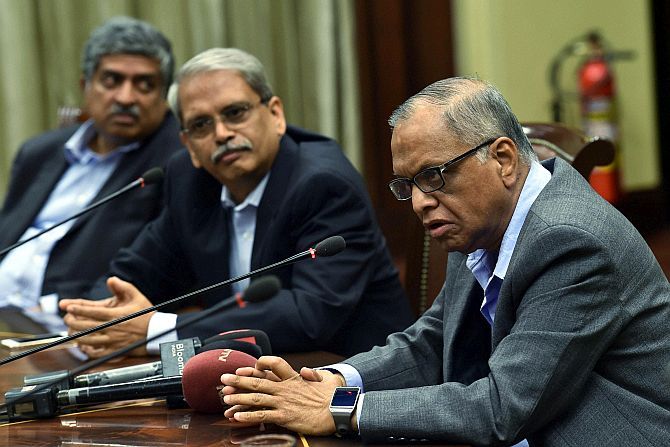'It was a bellwether brand not just for stock performance but also for its corporate governance. That image of being "holier-than-thou" has taken a beating for sure. The fight between the founders, the board and the CEO makes Infosys like any other corporation: ordinary and common place.'
Ayan Pramanik reports on how the company is fighting on multiple fronts to recover from the damage caused by Vishal Sikka's exit.

Photograph: Shailendra Bhojak/PTI Photograph.
Much like many of its new-age peers, Infosys, the three-decade old Indian information technology (IT) services behemoth, resorted to a Facebook video to boost employee morale in the midst of the raging battle between Narayana Murthy and the board.
More than reassuring employees, the video is also an attempt to insulate the brand from the messy mud-slinging that has enveloped one of the country's most respected companies.
But can social media outpourings and tough talk by the founders help the brand get the grime off its image?
In the ongoing Infosys saga, the war of words has hit the brand where it hurts most; its claim of being a well-governed corporation.
It is here that experts believe using employees to reassure potential recruits and clients is an effective measure. Such messaging helps calm customers down while presenting the company as a cool place to work in.
Not all are as optimistic.
"It has robbed the Infosys brand of its sheen. It was a bellwether brand not just for stock performance but also for its corporate governance. That image of being 'holier-than-thou' has taken a beating for sure. The fight between the founders, the board and the CEO makes Infosys like any other corporation: ordinary and common place," said Sandeep Goyal, founder of Mogae Media.
Founder-management tussles hit the company's image and have a cascading effect on morale within the organisation, leading to disenchantment among employees. It also does irreparable harm to the company's image outside, among clients, who could start pulling back or pulling out of their association with Infosys.
In such cases transparency is the key to keeping the mud from sticking to the brand.
The situation is comparable to automobile companies and auto recalls. According to consumer surveys, customers see recalls as a measure of honesty and recalls actually foster brand loyalty.
Here, the Infosys brand image was helped by the fact that Narayana Murthy was vocal and insistent that his fight was against "hefty" severance packages and other irregularities.
As a result, the perception that was created was that of an honest company fighting to stay clean and the brand remained unaffected as founders were quick enough to take control, said analysts.
At the same time, when it got employees to come forward in its defence, the company gained the trust of potential recruits and its clients.
K V Pops Sridhar, founder of brand consultancy, Hyper Collective, said that the human resources of India's second largest IT services exporter should play an important role.
"Employees have to be kept informed. The HR has a very important role to play in articulating the values of the company," pointed out Sridhar.
"Employees tend to be impacted more than clients simply because their jobs are on the line directly," said Goyal. And to that extent getting them to speak on behalf of the company works best.
With Infosys, given that the people ranged against each other are trusted and seen as high achieving professionals, matters are particularly confusing.
None is completely sure about who is speaking for the brand. Still brand experts said that the company had done well to clip the speculation short by quickly appointing Nandan Nilekani at the helm of affairs. Had the feud continued, the brand would have lost more sheen and allowed its peers to gain.
Nilekani's return sent out the message that the founders were taking control.
The public spat has led to investors exiting the shares, erasing ₹23,000 crore of shareholder wealth of the company and it was important to convey this message.
Ramesh Thomas, president of Equitor said, "Infosys has a tremendous amount of brand value as it is a very good scrip. They do three levels of financial reporting, and they started voluntarily complying with the IFRS standards, which are much more complex. So, anybody in the world should be able to review (Infosys) transparently."
"I think people who have come out smelling like roses out of this (tussle) are NRN and the founders," said Harish Bijoor, brand expert, adding that even though there were worries whether this was a fight between a professional management and a founder-oriented management, the worries "were quelled very efficiently on the client side" by Infosys's strong operational execution.
But there is a flip side to Murthy's strong campaign too; it conveys the impression of a set of founders unwilling to let go and let the company grow. That has a negative impact on the brand.
However Murthy is countering that and has told investors on Wednesday that he preferred to raise his voice and not keep quiet as that would have had a potential to "mortally wound" brand Infosys in the long run.
"There could be clash of ideologies (between professional management and founders), which is bound to happen; but if they (professional management) compromise on values, which founders are possessive of, it becomes very difficult," said Sridhar.
He said that both in Tata Sons and Infosys, it is not only about how you conduct business, set growth strategies right; but it is a question of the values set by founders.
Companies such as Infosys and its peers TCS, Wipro and other have seen a disruption and change in demand from their customers across different global markets. This has resulted in a slowdown in business and shareholder returns. Notwithstanding the changing business environment, experts said, brands remain strong only when there are strong governance values.













 © 2025
© 2025